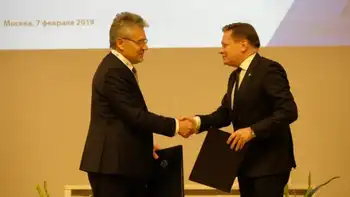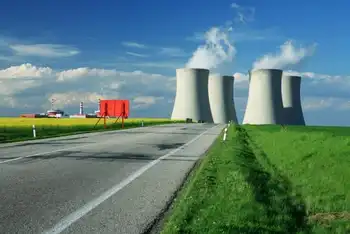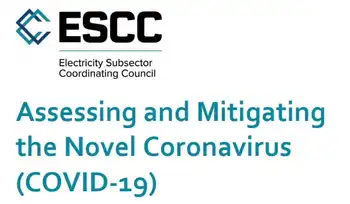ESCC COVID-19 Resource Guide outlines control center continuity, sequestration, social distancing, remote operations, testing priorities, mutual assistance, supply chain risk, and PPE protocols to sustain grid reliability and plant operations during the COVID-19 pandemic.
Key Points
An industry guide to COVID-19 mitigation for the power sector covering control centers, testing, PPE, and mutual aid.
✅ Control center continuity: segregation, remote ops, reserve shifts
✅ Sequestration triggers, testing priorities, and PPE protocols
✅ Mutual assistance, supply chain risk, and workforce planning
The latest version of the Electricity Subsector Coordinating Council’s (ESCC’s) resource guide to assess and mitigate COVID-19 suggests the U.S. power sector continues to grapple with key concerns involving control center continuity, power plant continuity, access to restricted and quarantined areas, mutual assistance, and supply chain challenges, alongside urban demand shifts seen in Ottawa’s electricity demand during closures.
In its fifth and sixth versions of the “ESCC Resource Guide—Assessing and Mitigating the Novel Coronavirus (COVID-19),” released on April 16 and April 20, respectively, the ESCC expanded its guidance as it relates to social distancing and sequestration within tight power sector environments like control centers, crucial mitigation strategies that are designed to avoid attrition of essential workers.
The CEO-led power sector group that serves as a liaison with the federal government during emergencies introduced the guide on March 23, and it provides periodic updates sourced from “tiger teams,” which are made up of representatives from investor-owned electric companies, public power utilities, electric cooperatives, independent power producers (IPPs), and other stakeholders. Collating regulatory updates and emerging resources, it serves as a general shareable blueprint for generators, transmission and distribution (T&D) facilities, reliability coordinators, and balancing authorities across the nation on issues the sector is facing as the COVID-19 pandemic endures.
Controlling Spread at Control Centers
While control centers are typically well-isolated, physically secure, and may be conducive to on-site sequestration, the guide is emphatic that staff at these facilities are typically limited and they need long lead times to be trained to properly use the information technology (IT) and operational technology (OT) tools to keep control centers functioning and maintain grid visibility. Control room operators generally include: reliability engineers, dispatchers, area controllers, and their shift supervisors. Staff that directly support these function, also considered critical, consist of employees who maintain and secure the functionality of the IT and OT tools used by the control room operators.
In its latest update, the ESCC notes that many entities took “proactive steps to isolate their control center facilities from external visitors and non-essential employees early in the pandemic, leveraging the presence of back-up control centers, self-quarantining of employees, and multiple shifts to maximize social distancing.” To ensure all levels of logistical and operational challenges posed by the pandemic are addressed, it envisions several scenarios ranging from mild contagion—where a single operator is affected at one of two control center sites to the compromise of both sites.
Previous versions of the guide have set out universal mitigation strategies—such as clear symptom reporting, cleaning, and travel guidance. To ensure continuity even in the most dire of circumstances, for example, it recommends segregating shifts, and even sequestering a “complete healthy shift” as a “reserve” for times when minimum staffing levels cannot be met. It also encourages companies to develop a backup staff of retirees, supervisors, managers, and engineers that could backfill staffing needs.
Meanwhile, though social distancing has always been a universal mitigation strategy, the ESCC last week detailed what social distancing at a control room could look like. It says, for example, that entities should consider if personnel can do their jobs in spaces adjacent to the existing control room; moving workstations to allow at least six feet of space between employees; or designating workstations for individual operators. The guide also suggests remote operations outside of a single control room as an option, and some markets are exploring virtual power plant models in the UK to support flexibility, though it underscores that not all control center operations can be performed remotely, and remote operations increase the potential for security vulnerabilities. “The NERC [North American Electric Reliability Corp.] Reliability Standards address requirements for BES [bulk electric system] control centers and security controls for remote access of systems, applications, or data,” the resource guide notes.
Sequestration—Highly Effective but Difficult
Significantly, the new update also clarifies circumstances that could “trigger” sequestration—or keeping mission-essential workers at facilities. Sequestration, it notes, “is likely to be the most effective means of reducing risk to critical control center employees during a pandemic, but it is also the most resource- and cost-intensive option to implement.”
It is unclear exactly how many power sector workers are currently being sequestered at facilities. According to the American Public Power Association (APPA), as of last week, the New York Power Authority was sequestering 82 power plant control room and transmission control operator, amid New York City’s shifting electric rhythms during COVID-19; the Sacramento Municipal Utility District (SMUD) in California had begun sequestering critical employees; and the Electric & Gas Utility at the City of Tallahassee had 44 workers being rotated in and out of sequestration. Another 37 workers from the New York ISO were already being sequestered or housed onsite as of April 9. PJM began sequestering a team of operators on April 11, and National Grid was sequestering 200 employees as of April 12.
Decisions to trigger sequestration at T&D and other grid monitoring facilities are typically driven by entities’ risk assessment, ESCC noted. Considerations may involve:
The number of people showing symptoms or testing positive as a percentage of the population in a county or municipality where the control center is sited. One organization, for example, is considering a lower threshold of 10% community infection as a trigger of “officer-level decision” to determine whether to sequester. A higher threshold of 20% “mandates a move to sequestration,” ESCC said.
The number of essential workers showing symptoms or having tested positive. “Acceptable risk should be based on the minimum staffing requirements of the control center and should include the availability of a reserve shift for critical position backfills. For example, shift supervisors are commonly certified in all positions in the control center, and the unavailability of more than one-third of a single organization’s shift supervisors could compromise operations,” it said.
The rate of infection spread across a geographic region. In the April 20 version, the guide removes specific mention that cases are doubling “every 3–5 days or more frequently in some areas.” It now says: “Considering the rapid spread of COVID-19, special care should be taken to identify the point at which control center personnel are more likely than not to come into contact with an infected individual during their off-shift hours.”
Generator Sequestration Measures Vary
Generators, meanwhile, have taken different approaches to sequester generation operators. Some have reacted to statewide outbreaks, others to low reserves, and others still, as with one IPP, to control exposure to smaller staffs, which cannot afford attrition. The IPP, for example, decided sequestration was necessary because it “did not want to wait for confirmed cases in the workforce.” That company sequestered all its control room operators, outside operators, and instrumentation and control technicians.
The ESCC resource guide says workers are being sequestered in several ways. On-site, these could range from housing workers in two separate areas, for example, or in trailers brought in. Off-site, workers may be housed in hotel rooms, which the guide notes, “are plentiful.”
Location makes a difference, it said: “Onsite requires more logistical co-ordination for accommodations, food, room sanitization, linens, and entertainment.” To accommodate sequestered workers, generators have to consider off-site food and laundry services (left at gates for pick-up)—and even extending Wi-Fi for personal use. Generators are learning from each other about all aspects of sequestration—including how to pay sequestered workers. It suggests sequestered workers should receive pay for all hours inside the plant, including straight time for regularly scheduled hours and time-and-a-half for all other hours. To maintain non-sequestered employees, who are following stay-at-home protocols, pay should remain regularly scheduled, it says.
Testing Remains a Formidable Hurdle
Though decisions to sequester differ among different power entities, they appear commonly complicated by one prominent issue: a dearth of testing.
At the center of a scuffle between the federal and state governments of late, the number of tests has not kept pace with the severity of the pandemic, and while President Trump has for some weeks claimed that “Testing is a local thing,” state officials, business leaders—including from the power sector—and public health experts say that it is far short of the several hundred thousands or perhaps even millions of daily tests it might take to safely restart the economy, even as calls to keep electricity options open grow among policymakers, a three-phase approach for which the Trump administration rolled out this week. While the White House said the approach is “based on the advice of public health experts, the suggestions do not indicate a specific timeframe. Some hard-hit states have committed to keeping current restrictions in place. New York on April 16 said it would maintain a shutdown order through May 15, while California published its own guidelines and states in the Northeast, Midwest, and West Coast entered regional pacts that may involve interstate coordination on COVID-19–related policy going forward.
On Sunday, responding to a call by governors across the political spectrum that insisted the federal government should step up efforts to help states obtain vital supplies for tests, Trump said the federal government will be “using” and “preparing to use” the Defense Production Act to increase swab production.
For the power entities that are part of the ESCC, widespread testing underlies many mitigation strategies. The group’s generation owners and operating companies, which include members from the full power spectrum, have said testing is central to “successful mitigation of risk to control center continuity.”
In the updated guide, the entities recommend requesting that governmental authorities—it is unclear whether the focus should be on the federal or state governments—“direct medical facilities to prioritize testing for asymptomatic generation control room operators, operator technicians, instrument and control technicians, and the operations supervisor (treat comparable to first responders) in advance of sequestered, extended-duration shifts; and obtain state regulatory approval for corporate health services organizations to administer testing for coronavirus to essential employees, if applicable.”
The second priority, as crucial, involves asking the government to direct medical facilities to prioritize testing for control room operators before they are sequestered or go into extended-duration shifts.
Generators also want local, regional, state, and federal governments to ensure operators of generating facilities are allowed to move freely if “populace-wide quarantine/curfew or other travel restrictions” are enacted. Meanwhile, they have also asked federal agencies and state permitting agencies to allow for non-compliance operations of generating facilities in case enough workers are not available.
Lower on its list, but still “medium priority,” is that the government should obtain authority for priority supply of sanitizing supplies and personal protective equipment (PPE) for generating facilities. They are also asking states to allow power plant employees (as opposed to crucially redirected medical personnel) to administer health questionnaires and temperature checks without Americans with Disabilities Act or other legal constraints. Newly highlighted in the update, meanwhile, is an emphasis on enough fire retardant (FR) vests and hoods and PPE, including masks and face coverings, so technicians don’t have to share them.
The worst-case scenario envisioned for generators involves a 40% workforce attrition, a nine-month pandemic, and no mutual assistance. As the update suggests, along with universal mitigation strategies, some power companies are eliminating non-essential work that would require close contact, altering assignments so work tasks are done by paired teams that do not rotate, and ensuring workers wear masks. The resource guide includes case studies and lessons learned so far, and all suggest pandemic planning was crucial to response.
Gearing Up for Mutual Assistance—Even for Generation—During COVID-19
Meanwhile, though the guide recognizes that protecting employees is a key priority for many entities, it also lauds the crucial role mutual assistance plays in the sector’s collective response to the pandemic, even as coal and nuclear plant closures test just transition planning across regions. Mutual assistance is a long-standing power sector practice in the U.S. Last week, for example, as severe weather impacted the southern and eastern portions of the U.S., causing power outages for 1.3 million customers at the peak, the sector demonstrated the “versatility of mutual assistance processes,” bringing in additional workers and equipment from nearby utilities and contractors to assist with assessment and repair. “Crews utilized PPE and social distancing per the CDC [Centers for Disease Control and Prevention] and OSHA [Occupational Safety and Health Administration] guidelines to perform their restoration duties,” the Energy Department told POWER.
But as the ESCC’s guide points out, mutual assistance has traditionally been deployed to help restore electric service to customers, typically focused on T&D infrastructure. The COVID-19 pandemic, uniquely, “has motivated generation entities to consider the use of mutual assistance for generation plant operation” it notes. As with the model it proposes to ensure continuity of control centers, mutual aid poses key challenges, such as for task variance, knowledge of operational practice, system customization, and legal indemnification.
Among guidelines ESCC proposes for generators are to use existing employee work stoppage plans as a resource in planning for the use of personnel not currently assigned to plant operation. It urges, for example, that generators keep a list of workers with skills who can be called from corporate/tech support (such as former operators or plant engineers/managers), or retirees and other individuals who could be called upon to help operate the control room first. ESCC also recommends considering the use of third-party contractor operations to supplement plant operations.
Key to these efforts is to “Create a thorough list of experience and qualifications needed to operate a particular unit. Important details include fuel type, OEM [original equipment manufacturer] technology, DCS [distributed control system] type, environmental controls, certifications, etc,” it says. “Consider proactively sharing this information internally within your company first and then with neighboring companies”—and that includes sufficient detail from manufacturers (such as Emerson Ovation, GE Mark VI, ABB, Honeywell)—“without exposing proprietary information.” One way to control this information is to develop a mutual assistance agreement with “strategic” companies within the region or system, it says.
Of specific interest is that the ESCC also recommends that generators consider “leaving units in extended or planned maintenance outage in that state as long as possible.” That’s because, “Operators at these offline sites could be considered available for a site responding to pandemic challenges,” it says.
However, these guidelines differ by resource. Nuclear generators, for example, already have robust emergency plans that include minimum staffing requirements, and owing to regulations, mutual aid is managed by each license holder, it says. However, to provide possible relief for attrition at operating nuclear plants, the Nuclear Regulatory Commission (NRC) on March 28 outlined a streamlined process that could allow nuclear operators to obtain exemptions from work hour rules, while organizations also point to IAEA low-carbon electricity lessons for future planning.
Uncertainty of Supply Chain Endurance
As the guide stresses, operational continuity during the pandemic will require that all power entities maintain supply of inputs and physical equipment. To help entities plan ahead—by determining volumes needed and geographic location of suppliers—it lists the most important materials needed for power delivery and bulk chemicals. “Clearly, the extent and duration of this emergency will influence the importance of one supply chain component compared to another,” it says.
As Massachusetts Institute of Technology supply chain expert David Simchi-Levi noted on April 13, global supply chains have been heavily taxed by the pandemic, and manufacturing activities in the European Union and North America are still going offline. China is showing signs of slow recovery. Even in the best-case scenario, however—even if North America and Europe manage to control and reduce the pandemic—the supply chain will likely experience significant logistical capacity shortages, from transportation to warehousing. Owing to variability in timing, he suggested that companies plan to reconfigure supply chains and reposition inventory in case suppliers go out of business or face quarantine, while some industry groups urge investing in hydropower as part of resilient recovery strategies.
Also in short supply, according to ESCC, is industry-critical PPE. “While our sector recognizes that the priority is to ensure that PPE is available for workers in the healthcare sector and first responders, a reliable energy supply is required for healthcare and other sectors to deliver their critical services,” its resource guide notes. “The sector is not looking for PPE for the entire workforce. Rather, we are working to prioritize supplies for mission-essential workers – a subset of highly skilled energy workers who are unable to work remotely and who are mission-essential during this extraordinary time.”
Among critical industry PPE needs are nitrile gloves, shoe covers, Tyvek suits, goggles/glasses, hand sanitizer, dust masks, N95 respirators, antibacterial soap, and trashbags. While it provides a list of non-governmental PPE vendors and suppliers, the guide also provides several “creative” solutions. These include, for example, formulations for effective hand sanitizer; 3D printer face shield files; methods for decontaminating face piece respirators and other PPE; and instructions for homemade masks with pockets for high-efficiency particulate air (HEPA) filter inserts.
Related News













